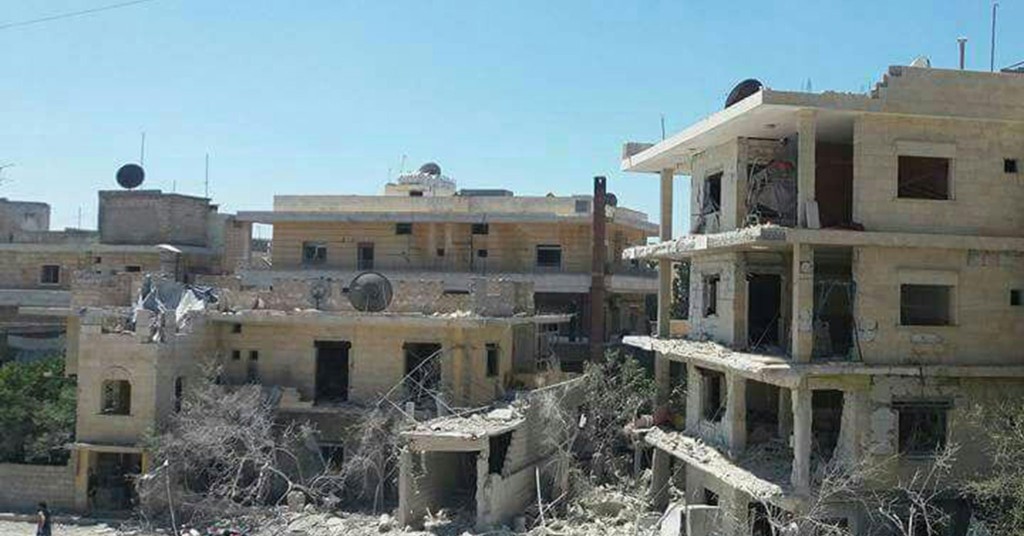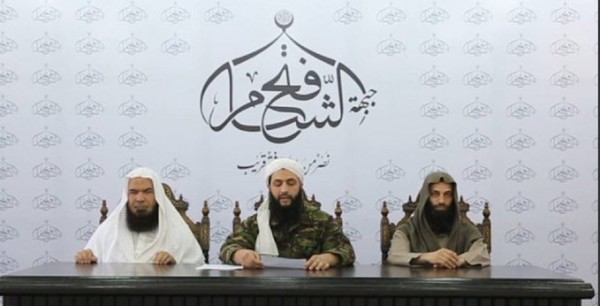PHOTO: Video conference of Jabhat al-Nusra leader Abu Mohammad al-Joulani on Thursday
LATEST
- Pro-Assad Strike on Large Maternity Hospital in Idlib Province Kills 2, Wounds Many
- Claimed Photo: Head of Pro-Assad Militia with Kurdish Fighters in Aleppo City
- US & UN Criticize Russia “Humanitarian” Proposal for Besieged Aleppo
- Local Coordination Committees: 99 Deaths on Thursday
- Video: Russian “Double-Tap” Airstrike on Civilians and Rescuers
FRIDAY FEATURE
Opinion: Why is the US Covering for Russia’s War Crimes?
The statement from the leader of the jihadist group Jabhat al-Nusra was expected, but its significance in Syria’s conflict will go far beyond immediate headlines.
In a four-minute video, Abu Mohammad al-Joulani announced that the group would separate from Al-Qa’eda “in the necessity of the continuity of the jihad of al-Sham [Syria]” and would now be known as “Jabhat Fatah al-Sham”.
See Syria Video: In 1st Public Appearance, Nusra’s al-Joulani Announces Separation from Al-Qa’eda
Unsurprisingly, that breaking of the formal mantra “Al-Qae’da-linked Jabhat al-Nusra” — which has dominated much of the attention to the group by politicians, analysts, and media — grabbed headlines. So did the appearance of Joulani for the first time without disguising his face.
But these are only the start of Jabhat al-Nusra’s power play. It is a move which is not — and has not been — about a global battle with the US, but about the quest for local authority. That quest is versus all other actors: the Assad regime; the Islamic State; the Americans, the Russians, the Iranians, and Hezbollah; and against the rebels with whom Nusra has often allied on the battlefield, but also fought for political and social influence throughout Syria.
In a 6 1/2-minute audio prelude to Joulani’s announcement, Al-Qa’eda leader Ayman al-Zawahiri recognized this dynamic as he endorsed Nusra’s separation. Abu al-Khayr al-Masri, a deputy to Zawahiri, explained, “After studying the situation in Syria… we approve any possible action that will preserve jihad in the Levant.”
See Syria Feature: Al-Qa’eda OKs Jabhat al-Nusra Separation
Having fulfilled the pre-condition of separation from Al Qa’eda set by rebel factions and backers like Saudi Arabia — albeit 15 months after it was set — Joulani and Jabhat Fatah al-Sham will now seek leadership within a “united” rebellion. That short-term effort will probably rest on dealing with a battlefield and political crisis from two linked challenges: 1) the Russian-enabled offensive by the Syrian military, Iran, Hezbollah, and other foreign militias that is now threatening to strangle the opposition in Aleppo city, and to seize territory in other areas of Syria; 2) the de facto US acceptance of that offensive through its cut-off of almost all backing to rebels, unless it is used in fighting the Islamic State rather than the Assad regime.
In the longer-term, any immediate “unity” will confront the deep divisions between not only Jabhat Fatah al-Sham and rebel groups, but also between JFS, the Syrian opposition, and local communities and even between al-Joulani and many of his fighters. As a local analyst explained, before Joulani’s statement, ideology is for JFS’s leaders — most of its men on the battlefield are more concerned about their homes and families.
But that longer-term will not matter unless the immediate threat — which is not the declared US campaign against Nusra/JFS but the immediate regime-Russian-Iranian-Hezbollah campaign, abetted by Washington, against opposition-held territory — is met.
That was the implicit but clear message from Abu Mohammad al-Joulani.
We are working on an in-depth analysis for publication in coming days.
A Charter for Sharia and Against Oppression
Jabhat Fatah al-Sham’s charter combines the ideology of the leadership with the recognition of the local battle.
The 10-point document declared that jihad “against the enemy who aggresses religion and the sanctities of the Muslims” is for the goal of a system of Shari’a. That system will be led by “the scholars” who are “in very high esteem”.
However, the charter appeals beyond its adherents to declare the common fight — in effect, against the Assad regime in Syria: “We strive to lift oppression from all those who are oppressed, be them people of Islam or disbelief.” We strive to stop the oppressor from oppressing others by all possible means and to the utmost of our power.
Combining ideology and political intent, it calls for “unity and harmony”, with enmity towards “disbelievers” and towards Muslims “in proportion to their involvement in evil deeds and innovations”.
Pro-Assad Strike on Large Maternity Hospital in Idlib Province Kills 2, Wounds Many
Russia-regime airstrikes have bombed another hospital in northwest Syria, this time a large maternity facility in Idlib Province.
At least two people were killed and many injured in the attack on Friday afternoon, according to Save the Children, which supports the hospital. The toll is expected to rise as recovery work continues.
The largest maternity hospital in the area, the facility treats patients from a 70-mile radius and delivers more than 700 babies every month.

The strike is the latest in a Russian-regime campaign since last September which has destroyed or damaged scores of hospitals and other medical facilities in northwest Syria, killing hundreds of civilians.
See Syria Daily, July 25: The Russia-Regime War on the Hospitals
Claimed Photo: Head of Pro-Assad Militia with Kurdish Fighters in Aleppo City
A photo is circulating which claims to show a de facto alliance between the Kurdish militia YPG and pro-Assad forces in the battle against rebels inside Aleppo city.
The image purportedly shows the head of a Shia militia group — backed by the elite Iranian Qods Force, led by General Qassem Soleimani — with Kurdish fighters after the withdrawal of rebels from the Bani Zeid district on Wednesday:
L:Head of Liwa Al-Baqir,Shia militia group,Alhaj Khalid&YPG fighters after encircling Aleppo
R:with Qassem Soleimani pic.twitter.com/FlR65tLBQH— گزارش جنگ سوریه عراق (@warreports) July 29, 2016
Pro-opposition activists on Thursday claimed that the YPG, which seized rebel territory in Aleppo Province earlier this year, had assisted the breakthrough of the Syrian military and its foreign allies after months of battles with rebels in Bani Zeid and Layramoun.
US & UN Criticize Russia “Humanitarian” Proposal for Besieged Aleppo
Both the US and the UN have reacted coolly to Russia’s initiative — coordinated with the Assad regime — combining the siege of opposition-held areas of Aleppo city with a declaration of “corridors” for civilians and surrendering rebels to leave.
Russian Defense Minister Sergei Shoigu said on Thursday that three corridors into regime-controlled territory could be established for civilians and one for rebels. The step was combined with President Assad’s decree of amnesty for any rebel surrendering within three months and leaflets on east Aleppo calling on residents to flee.
Neither the US nor the UN was informed in advance of the Russian move.
“Without further clarification, it would appear to be a demand for surrender of opposition groups, and the forced evacuation of innocent civilians from Aleppo,” State Department spokesman John Kirby said on Thursday. “The innocent people of Aleppo should be able to stay in their homes safely and receive the humanitarian access, which Russia and the regime have agreed … according to the UN Security Council resolution.”
UN Syria envoy Staffan de Mistura said bluntly:
We actually learned…during the [humanitarian] task force [meeting about] this breaking news of a Russian military proposal. It is premature for me and others to actually make any comments until we have further details on what has been and is the Russian proposal.
Local activists said there is no evidence yet of a corridor being set up by Russian or Syrian forces. Instead, bombing of opposition-held areas of Aleppo continued on Thursday.
Local Coordination Committees: 99 Deaths on Thursday
The Local Coordination Committees documented 99 deaths, including 19 children and 12 women, on Thursday.
Of the deaths, 71 were in Aleppo Province. Many of the victims were executed by the Islamic State in Boweir village, after an ISIS counter-attack against the Kurdish-led offensive on the city of Manbij. Others were killed by Russian-regime bombing in opposition-held areas of Aleppo city.
Aftermath of a Russian-regime attack:
Assad-Russian airstrikes killed 6 civilians & injured several others in #Aleppo’s Karm al-Beik – Aleppo Media Center pic.twitter.com/k5cjJAD6I6
— Orient News English (@OrientNewsEn) July 29, 2016
There are also reports that US warplanes killed more civilians near Manbij, this time said in the village of al-Ghandour to the north.
Unconfirmed claims said 28 people, including seven children, died.
Last week, about 160 civilians were reportedly killed by US attacks which included missile strikes on a school housing displaced Syrians. The incident was the deadliest mass killing of civilians by American attacks since its intervention began in Syria in September 2014.
Video: Russian “Double-Tap” Airstrike on Civilians and Rescuers
Footage from a Russian “double-tap” airstrike which first attacked civilians, then first responders in Karm al-Baik in Aleppo Province on Thursday night — activists said at least five people were killed:

